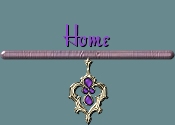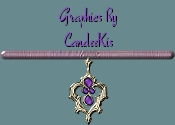






From NYTimes.com: Tennis Family Monopoly Goes on with Epic Serena Win
January 23, 2003--Filed at 8:45 a.m. ET
MELBOURNE (Reuters) - Serena Williams saved two match points and came from 5-1 down in the final set to beat Kim Clijsters 4-6, 6-3, 7-5 Thursday and reach her first Australian Open final in one of the greatest comebacks in tennis history.
``I honestly don't know how I was able to win,'' a stunned Serena said on court afterwards. ``I just thought 'keep fighting'... I really didn't expect to win at that point,'' she said of the turnaround.
The world number one had looked all punched out against the strong crowd favorite but somehow turned the final set on its head to win six straight games and remain on track to become only the fifth woman in history to hold all four grand slam titles at the same time.
Just Maureen Connolly, Margaret Court, Martina Navratilova and Steffi Graf have achieved the feat and Serena will face elder sister Venus in Saturday's championship decider in a bid to join them.
The final will be the fourth consecutive grand slam the sisters will have contested, Serena having won the 2002 French, Wimbledon and U.S. Open finals.
Venus earlier beat Clijsters's friend and compatriot Justine Henin-Hardenne 6-3, 6-3 on a bleak day for Belgium.
Clijsters had been poised to smash apart the Williams family's grand slam monopoly but wilted at the death.
MOUNTED COMEBACK
Her nerves ragged, she could barely put a ball in court as Serena mounted her comeback.
The final game of the match perfectly illustrated the Belgian's fragile condition as she plopped four consecutive serves out before finally crumbling for good.
It was a phenomenal victory for Serena, though, and one which highlighted her tigerish fighting qualities.
``I just kept fighting and the next think I knew I had won... it was an incredible battle out there,'' she said.
``I was fortunate -- Kim played so well.''
Clijsters, skipping from side to side, got off to a great start, harrying and hustling her way to the opening set with some crashing backhand drives.
The pair exchanged loose breaks at the start of the second set before settling into a rhythm which Serena then smashed with a break for 3-2 in the fifth game. The American served up a salvo of vicious returns and ground strokes four games later to break again when Clijsters sent a forehand flying long to hand the set to the American 6-3 after 75 minutes.
A couple of forehand errors allowed Clijsters to break immediately in the third as the momentum took another major shift in this absorbing contest.
She held for a 2-0 lead and when Serena slapped a forehand into the net on the first point of the third game, a plaintive call of ``Serena, stop!'' escaped from the frustrated player.
WILD FOREHAND
She held serve before receiving treatment for a nasty blister on the ball of her right foot.
The American attracted boos and jeers from the crowd when she immediately took a second three-minute injury break for a 'separate injury' although the trainer continued to work on the same foot.
Clijsters was left to stew for more than six minutes courtside but when she eventually served she held for 3-1 and the crowd exploded.
Serena fell love-40 behind in the next game. She saved the first break point with a drop shot which landed on the net before dropping over but lost the second with a wild forehand.
Clijsters kept up the momentum to take a 5-1 lead as Serena's hopes looked lost.
She staved off defeat by holding for 5-2 and saved two match points in the next game with a big drive from the back of the court and a flying forehand volley, eventually breaking to trail 5-3 but still had much to do.
Holding serve to win her third straight game, Serena heaped the pressure back on the wilting Clijsters.
Two double faults -- only her third and fourth of the match -- put Clijsters on the back foot and nerves strangled the Belgian's chance. She dropped serve again to allow Serena back on level terms.
The top seed held for a 6-5 lead as Clijsters's jangling nerves unraveled and her game fell apart.
Clijsters pushed a backhand long to give Serena three match points in the next game. But the American needed just one to complete a famous victory.
Venus's victory was less dramatic but the elder sibling was no less pleased after finishing Henin-Hardenne off in 74 minutes.
``It's so exciting. You know I've struggled and failed and done everything but get to this position before where I can win the Australian Open,'' the 22-year-old beamed after a jig of victory on court. ``I am just so happy.''
Venus's previous best finish here was a semi-final finish in 2001, the year Serena put in her best effort reaching the quarter-finals.
This year one will have her name on the trophy.

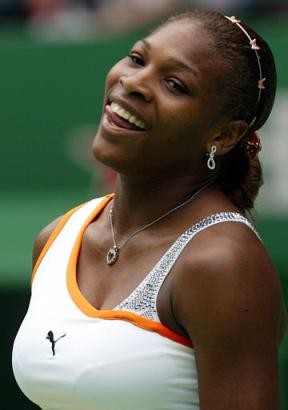
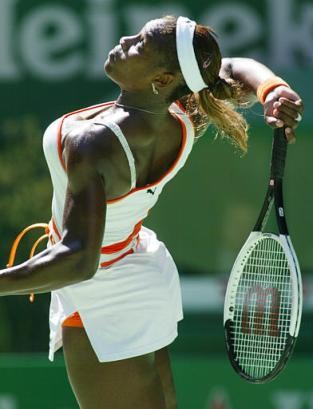
From ESPN.com: Serena refuses to be stopped
Associated Press
Thursday, January 23
MELBOURNE, Australia -- Blisters, a big deficit and two match points couldn't derail the "Serena Slam.''
Now only her sister stands in Serena Williams' way.
Serena rallied from two breaks down in the final set to beat Kim Clijsters 4-6, 6-3, 7-5 in the Australian Open semifinals Thursday and set up a fourth straight major final against her sister Venus.
"I'm a fighter,'' Serena said. "I didn't come all these miles to lose.''
Serena beat Venus in the finals at the French Open, Wimbledon and U.S. Open last year. One more win means she will be the first woman to hold all four major titles at once since Steffi Graf nine years ago.
The sisters also combined to reach the women's doubles final, beating Lindsay Davenport and Lisa Raymond 6-2, 6-2.
Venus started another big day for the Williams sisters by beating Justine Henin-Hardenne 6-3, 6-3.
"Venus is actually playing a little better than me at this tournament,'' Serena said. "I've just got to pull something out of my back pocket to be able to go on to the next level.''
She said the two probably won't talk about the final in advance.
"I don't like to bring my work home,'' she added.
Serena struggled to hold up her end, bothered by blisters on her right foot and a flurry of unforced errors.
Trailing 5-1 in the final set, Williams held serve and then saved two match points -- one with a volley winner to end a long point -- before breaking Clijsters' serve.
"I really didn't think I'd win it at that stage,'' Williams said. "I just kept fighting, one point at a time. Next thing I knew, the match was over.''
Williams held again to make it 5-4. Clijsters then committed five straight faults to go down 0-30 and Williams eventually broke again to even the match. Williams then held serve to go up 6-5.
Williams broke Clijsters' serve at love to win her 27th straight Grand Slam match, throwing her arms in the air in celebration.
Williams struggled early. With a chance to even the first set at 5-all, she doubled faulted on the final two points to lose it. She had 22 unforced errors in the set.
After her sister arrived to cheer her on, Williams took advantage of tentative play by Clijsters to win the second set.
There was a nine-minute delay with Clijsters leading 2-1 in the third set when Williams needed an injury timeout to have blisters on her right foot treated.
Williams hopped around during the rest of the match, bothered by the foot.
Clijsters saved a break point to go up 3-1 then took control when Williams hit a forehand wide for yet another unforced error to make it 4-1. Clijsters held her serve the next game and appeared on her way to her second straight win over Williams.
She beat both Williams sisters to win the WTA Tour Championships last November but couldn't close the deal against Serena this time.
Clijsters said her only regret about her play was the two double faults that started the final set's 10th game. She recovered to 30-all before losing it.
"She just started playing so much more aggressively and hardly made any unforced errors any more,'' the 19-year-old Belgian said.
She said she would not have played her match points any differently, adding that Serena "took such a big risk to really go for her shots.''
After rallying to win a three-set match against Emilie Loit in the first round, Williams rolled into the semifinals, losing only 15 games in her last four matches.
Graf held all four major titles after adding the 1994 Australian title to her victories in the other majors in 1993.
Graf also is one of only three women with a true Grand Slam. She did that in 1988, following Maureen Connolly in 1953 and Margaret Court in 1970.
After a relatively easy win to open the day, Venus skipped off the court, clapping her hand against her raised racket, and then waited for her sister to play.
"It's so exciting. You know, I've struggled and failed, done everything but get this close to winning the Australian Open,'' said Venus, who never had gone past the semifinals here before and lost in the quarterfinals last year.
But Venus has made four straight Grand Slam finals and again her sister is standing in the way of a championship.
"Four in a row is real nice,'' she said. "I guess, at this point, I have the best opportunity to take the title home. At least, I'm in a position to be a winner. Hopefully, this time I'll be the victor.''
Henin-Hardenne, who recovered from cramps late in the match to beat Lindsay Davenport on Sunday, tested Williams at times with deep, heavy shots.
Williams sometimes was overpowering on her serve, starting the second game of the second set with three of her eventual seven aces.
But she also struggled at times with her serve, losing the third game of the match with two double faults.
Serving for the match at 5-2 in the second, she reached her first match point but double faulted three times and lost the game.
She wrapped up the 74-minute match when Henin hit a forehand long to set up match point and then hit just wide with a forehand aimed at Williams' open backhand corner.
"She's a great player. It seems like I'm playing her all the time in the big matches,'' said Williams, who improved to 7-1 against the 20-year-old Belgian.
Henin-Hardenne, the 2001 Wimbledon runner-up to Venus Williams, said that after her 3½-hour victory over Davenport, she still wasn't fresh.
"Venus played much more aggressively than me,'' she said. "She returned well, she served beautifully and came more often to the net.''


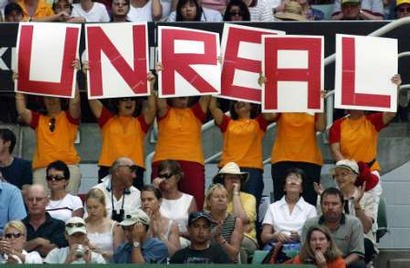
From THE AUSTRALIAN: It's an all-Williams women's final
Richard Yallop, Australian Open
January 23, 2003
WITH a breathtaking and nerveless fightback from seemingly certain defeat, Serena Williams yesterday set up yet another grand slam final meeting with sister Venus and kept intact her dream of a "Serena slam".
While illiams was ecstatic about her 4-6 6-3 7-5 victory over Kim Clijsters, after being 5-1 down in the deciding set, she acknowledged that an even more dangerous opponent awaited her in the final.
Although Serena struggled for much of the match to find her A game, elder sister Venus was dominant throughout her 6-3 6-3 win over fifth seed Justine Henin-Hardenne.
"Venus is actually playing a little better than me at this tournament," Serena said. "I have got to pull something out of my back pocket to be able to go onto the next level in the final, because she's playing really well."
The sisters have met in the past three grand slam finals, with Venus unable to take a set off Serena.
But form suggests the older sister has a better chance in Melbourne, unless Serena finds the vein of consistency she finally tapped in yesterday's last six games.
The sisters will not discuss the final.
"We will just talk about our semi-final matches," Serena said.
"We never talk about tennis outside of the court because I don't want to bring my work home. I try to separate the two."
Venus said: "I try not to think too much about my matches. I prepare when I'm on the practice court and after that I let go and watch TV, laugh, and read books. Once you start thinking too much, it can get to you."
Clijsters put on a characteristically brave smiling face afterwards, but in the final stages, as the Williams cyclone swept through, she was left standing on the court like someone whose house had been blown away by a force of nature.
Having done almost everything right, and carried the fight to Williams all the way, she achieved a double break of serve to lead 5-1. Everyone in the stadium except Williams thought the world No. 1 was finished.
Williams was thinking: "I've got nothing to lose. I just kept fighting one point at a time. To start with, I told myself, I don't want to lose 6-1. Then I don't want to lose 6-2. I always keep fighting and think positive. The next thing I knew, I'd come back."
It seemed as easy as that, but the way Williams saved the two match points, risking everything, moving to the net, and stretching her game to the limit, set the tone for the rest of the match.
The point of no return for Clijsters came when she came to serve for the match at 5-4, having already lost one service game. She hit successive double faults to go down 0-30, and although she fought her way back to 30-all, she couldn't withstand the cyclone any longer.
Clijsters said her only regret was those two double faults, although she said they weren't caused by nerves.
"I was feeling pretty good, even that game. She played so much more aggressive. Towards the end she tried to go for everything. She hit everything a little bit harder and closer to the line," she said.
"I kept fighting. I can't blame myself because I tried to hang in there. At the end, it just wasn't good enough. The only thing is that I could have made some more first serves, to try and get a little bit of an advantage from the beginning of the point. But you know, that's why she's No. 1. She can step it up."
Williams was unfairly booed by small sections of the crowd when she took an injury break for blisters after the third game of the final set, and again at the end, as she danced an amazed victory jig.
She could think of other great fightbacks, like the day in Sydney she came back from 5-2, 40-15 down in the final set against Lindsay Davenport. But a fourth successive major win wasn't at stake that day.
"I've always been a fighter," she said. "I think I give Venus a bit of fight because she says she didn't have as much fight before I came along."
For Venus, who has already won four majors, sister love does not extend to allowing her younger a free passage to a non calendar year grand slam.
"I'm just as hungry, just as motivated. On the court, I'm a competitor. No matter who it is, I hate to lose. The same with Serena – maybe even more. Off the court, we're sisters again."


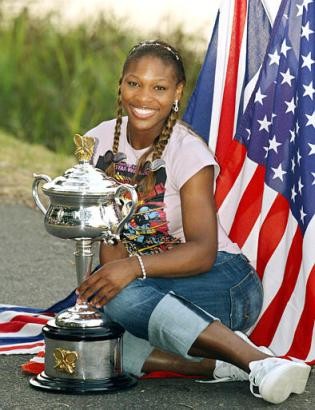
From NYTimes.com: Serena Williams Captures Fourth Straight Major
By CHRISTOPHER CLAREY
MELBOURNE, Australia, Saturday, Jan. 25 — Less than a year ago, after she had to withdraw from the Australian Open with a sprained ankle, she was still trying to catch up with her big sister. But in a breathtaking, fist-pumping, title-gobbling hurry, Serena Williams has become one of the greats.
She confirmed it today at Rod Laver Arena, maintaining her edge over her older sibling Venus by a much slimmer margin than usual to win this year's Australian Open, 7-6 (4), 3-6, 6-4, and become only the fifth woman to hold all four Grand Slam singles titles at once.
"It's really special to have come such a long way," she said.
It was not quite a true Grand Slam, which requires winning the Australian Open, the French Open, Wimbledon and the United States Open in the same calendar year. That feat was achieved by Maureen Connolly in 1953, Margaret Court in 1970 and Steffi Graf in 1988. Instead, Serena has chosen to dub her run the Serena Slam, an allusion to Tiger Woods's similar achievement in golf.
But whatever she or we choose to call it, there is no question that Serena's achievement is one of the most remarkable of the past decade in women's sports, all the more so considering that the depth and talent continue to increase in women's tennis, along with the physical demands.
The muted celebration after she broke Venus's serve to win the match was hardly in harmony with the moment, but then, no matter how many times the Williams sisters play on grand occasions, it is still not nearly as satisfying to beat your sibling and closest friend as it is to thump somebody outside the family circle. If this victory had come against Lindsay Davenport or Kim Clijsters, Serena would presumably have been shrieking with delight and pirouetting all over the Rebound Ace surface. Instead, when the last of many errant forehands from Venus sailed long to complete this match, Serena smiled and jogged to the net to shake hands and embrace her sister.
After more smiles and a few waves to the crowd, she was soon sitting in her chair, with a distant expression on her now familiar face. But when it came time to give her victory speech, the depth of her feelings surfaced.
"I never get choked up, never, but I'm really emotional right now and really, really happy," she said, beginning to cry. "I'd like to thank my mom and dad for always supporting me."
Unable to continue because of her tears, the extroverted Serena left the microphone and returned to her customary place on the last Saturday of Grand Slam tournaments: next to her sister Venus with a bigger trophy in her hands.
They are the first players in the 35-year Open era to have played in four consecutive major finals, and the 21-year-old Serena has won all four. Today's victory gave her a 6-5 career edge over Venus in matches, as well as a career edge in Grand Slam titles. She now has five to Venus's four.
"You have a great champion," the 22-year-old Venus told the crowd in her postmatch remarks. "Now she's won all four Grand Slams, which is something I would love to do someday. I'm trying to be just like her."
Venus got closer to victory today than she has in more than a year. Although this was their most competitive match in a Grand Slam tournament and the first to go three sets, Venus's nerves and two weakest shots — the second serve and the forehand — ultimately made the difference.
This was far from a great tennis match, certainly not by the standard of other memorable, three-set women's finals. Although both served relatively well, they still combined for 106 unforced errors: 54 for Serena and 52 for Venus. But there were several remarkable rallies and plenty of all-court play, with both coming to net with some frequency.
On the eve of this latest match, the Williamses' mother and coach, Oracene Price, who has reverted to her maiden name since her divorce from Richard Williams last year, expressed frustration with the public reaction to her daughters' dominance in Australia and elsewhere.
The Williams sisters had never played in a final at the Australian Open, yet there had been a palpable sense of resistance in the stands of Melbourne Park to the idea of a fourth straight all-Williams final in a major, with Serena's and Venus's victories being greeted in generally subdued fashion by the crowd and even with occasional boos.
Price believes there is more behind the ambivalence than just a craving for something new and a desire to support the underdog, which at this stage in women's tennis is anyone who is not named Williams.
Price said she believed there was also a racial component at work, suggesting that there were no complaints when Martina Navratilova and Chris Evert dominated women's tennis to much the same degree as her daughters do now.
"I don't quite understand that, because I've seen in the past with the same people getting into the same position, and it wasn't that big an issue," she said of public resistance to the prospect of all-Williams finals.
"I don't know really what the deal on that is: I guess it's because the environment of tennis has mostly been white. Especially over here in a culture where you see that people have conquered other people who were indigenous to this country. And the same thing in the United States. And I think it's a bit of arrogance, more or less: who has to be on top and who has to be on the bottom."
Price's reaction was triggered in part by the behavior of the crowd in Rod Laver Arena during Serena Williams's remarkable comeback from a 5-1 deficit in the third set in the semifinals to defeat Kim Clijsters of Belgium.
Clijsters, a 19-year-old who dates the Australian tennis star Lleyton Hewitt, is increasingly popular in Australia and was clearly the sentimental favorite during the match. But the crowd's favoritism intensified after Serena took two consecutive injury timeouts when trailing by 1-2 in the final set to have blisters on her right foot treated.
Rebound Ace, the rubberized hardcourt surface used here, is particularly punishing on players' feet, more so when the temperatures rise. One of Serena's blisters developed in her three-set, first-round match against Emilie Loit of France and had to be lanced afterward. It began bothering her again in the Clijsters match and, according to Price, was affecting her movement. The punctured blister certainly looked painful when a television cameraman showed footage of it as the trainer unwrapped the tape on Serena's right foot.
But the crowd could not see that image, and many of the fans interpreted her consecutive injury timeouts as an attempt to break Clijsters's rhythm. There was whistling and booing when Williams returned to the court, and the crowd roared when she missed a return on the first point. The next point was replayed after spectators shouted during the rally.
Clijsters and her coach, Marc Dehous, said they had no problem with Williams's seeking treatment at that stage of the match. Clijsters, after all, did win the next three games to take a 5-1 lead before Williams raised her game and intensity.
But Dehous said he understood the booing. Serena has acquired a reputation on the WTA Tour for making excuses in defeat, and Dehous alluded to her comments after Clijsters beat her in the final of last year's WTA Tour Championships in Los Angeles.
"Even after the loss in the Masters, Serena said she was feeling tired, but she only played 13 tournaments last year," Dehous said.
"So maybe they are a little bit the cause of that themselves," he said of the sisters and the booing, "because of what they say and how they act."
Asked what might change the public's attitude, Price answered, "I don't think anything can change it.
"Because people have to change here," she said, pointing to her heart.

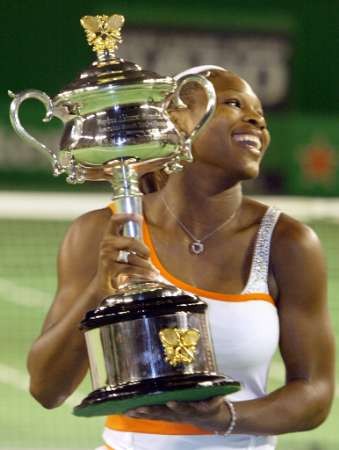
From ESPN.com: Enjoy the sibling show
By Mark Kreidler
Special to ESPN.com
Saturday, January 25, 2003
Venus and Serena Williams won a Grand Slam doubles match the other day, after which the women embraced, celebrated lightly, thanked their mother and began making preparations for the three-set Grand Slam singles match between them that Serena would capture not so long thereafter.
In other news: Lather, rinse repeat.
And above all, get used to it.
You hear about the rising state of women's tennis, the athletic and punishing players who will bring the next wave of high-level competition to the WTA Tour. It sounds perfectly wonderful. Then you turn on the television and it is all Williams all the time, just as it was during Saturday's Australian Open won by Serena, her fourth straight major title clinched with a victory over her sister Venus. Just to recap: Four ... straight ... Slams ... same two women.
And, anecdotally, at least, this is beginning to annoy the hell out of a selected segment of the tennis vox populi. If e-mails and phone calls are to be trusted (and, on so many levels, we know they really aren't), then the complaint that is registering the loudest lately centers on the notion that it's just too much Williams coming through the TV screen.
Frankly, that's a tough one, and I'll tell you why: It ain't gonna change. The two best women's tennis players in the world met in the finals of the Australian Open this weekend in Melbourne, and they're both named Williams, and, boy, does that not constitute breaking news.
The four consecutive Grand Slam finals to feature both Serena and Venus is a sibling record. And if the future does not explicity include both Williams sisters in every Slam final to come, it certainly suggests a scenario in which the two of them wind up playing one another just a whole truckload of times.
On a purely competitive level, this could be a thrilling ride. Assuming that we see, as we did in this final, the Williams sisters sincerely trying to take each other apart on the tennis court -- assuming, that is, that Venus and Serena both remain dedicated enough to the sport that they're only barely separated in terms of talent and court presence -- there can't be many more entertaining long-running rivalries. Serena's elation at winning that third set was real; Venus' disappointment was of a nature she couldn't hide. It was good (albeit not brilliant) tennis, but it was great theater.
But the complaints come rolling in all the same, and the view from here is that the daughters are mostly paying for the sins of the father. Richard Williams is so undeniably divisive a force that it's impossible to hear the derogatory comments about the Williams sisters (they're on TV too much, they've got too much attitude, they win too easily, they're not driven enough to capture the hearts of the truly ardent fan) without wondering whether they're not really meant to be directed at the dad.
On some levels, Tiger Woods passed through a similar stage at a fairly early point on his career's timeline. It was his father Earl, after all, who uttered the infamous bigger-than-Ghandi prediction those many years ago. It was Earl who made Woods out to be a demigod.
The public has since recoiled in horror countless times upon discovering -- and discovering again, and again -- that Tiger Woods is almost exclusively a golfer. Not a statesman, not a cause-carrier, but a golfer. It certainly wasn't Tiger who ever suggested otherwise, yet he paid for that image for a long time, and with a surprisingly hardy group of hold-outs among golf fans.
You'd hate to see the same thing dog the Williams sisters for too much of their careers. They've already been pummeled by accusations of tanking their matches with one another; they've already dealt with suggestions that Richard was orchestrating the winners of those matches.
Serena's now having won four straight Slam finals over Venus should have quieted that notion, and her willingness to go public with her desire for an undefeated season in 2003 seemed to raise her to a higher plateau of professional spirit altogether. And, for as long as she and Venus both stay focused on tennis (and no bets on how long that will be), she's got a truly legitimate foil in her own sister.
Forget the family connection: No two players of any kind have ever faced each other in four straight Slam finals in the 35-year history of Open-era tennis. Navratilova and Evert didn't manage it. Borg and McEnroe didn't. Graf and Seles didn't.
Venus and Serena did, and it's history that is going on here -- even if, so far, it is history of a one-sided flavor. It is history and family and rivalry and love and blood and money and sweat and glory and all that good stuff. The Williams sisters are running the world of women's tennis, and running into each other in the process. There can't be many levels on which someone could honestly transform that into a bad thing.
Mark Kreidler is a columnist with the Sacramento Bee and a regular contributor to ESPN.com

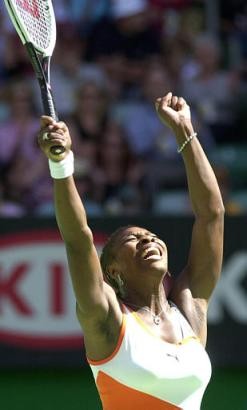
From BBC.co.uk: SERENA’S SLICE OF HISTORY~
Only five players in the history of women's tennis have held all four Grand Slam titles simultaneously
posted Saturday January 25,2003
Serena Williams
After winning the 1999 US Open, the younger of the Williams sisters looked to have lost her way somewhat as Venus dominated the women's game in the following two years.
But in the past 12 months, Serena has fulfilled her potential in spectacular style.
By beating her sister Venus to capture the Australian Open title, Williams joined a select group of the game's legendary figures.
In putting together a 28-match Grand Slam winning streak, Williams has not only demonstrated awesome power and devastating serving but a fighting spirit unmatched by her rivals.
Serena is yet to clinch the much-coveted Grand Slam - holding all four titles in a calendar year - but still only 21, she could yet put her four fellow history-makers in the shade.
Steffi Graf
Like Williams now and Martina Navratilova before her, Graf set new standards in women's tennis during five years of domination.
The German combined a vicious serve with a forehand that is still rated as one of the game's greatest shots.
In 1988, she began by easing to a straight sets win over Chris Evert in the Australian Open before demolishing a hapless Natasha Zvereva 6-0 6-0 at the French Open.
Navratilova gave Graf perhaps her hardest test at Wimbledon, but the world number one beat her American opponent for the first time at the All England Club to complete the hat-trick.
Graf went on to capture the Grand Slam at Flushing Meadows before achieving a unique "Golden Slam" by winning Olympic gold in Korea.
Martina Navratilova
By continuing to compete at the highest level in doubles, Navratilova is only underlining her natural talent and phenomenal athleticism.
In a singles career spanning 21 years, the Czech-born American won an astounding 18 Grand Slam titles along with 38 doubles crowns (and counting).
In 1984, Navratilova was handed a cheque for $1m when she lifted the French Open trophy, the last Grand Slam title to have eluded her.
Her achievement was all the more remarkable for the fact that she did not lose a set in all four finals and only dropped two sets in the entire run.
Margaret Court
Australian Open organisers reminded everyone of the achievements of Margaret Court when they renamed the second stadium at Melbourne Park in her honour.
A powerful athlete, her attacking serve-volley game took to her to the Grand Slam in 1970, beating Britain's Ann Jones in both the French Open and Wimbledon finals.
However, Court's achievements were undermined by the unwillingness of many players to travel to Australia for the first Grand Slam of the year.
And of the Aussie's 24 Grand Slam titles, 11 came in her home country.
Maureen Connolly
The first ever player to win the Grand Slam, Connolly, or "Little Mo", is remembered as a relentless baseliner - not unlike Williams.
Aged 16, she won her first Grand Slam title in 1951 in New York and lost only four matches after that until her injury-enforced retirement three years later.
Connolly's Grand Slam came in 1953, a year in which she also captured the doubles titles in France and Australia.

